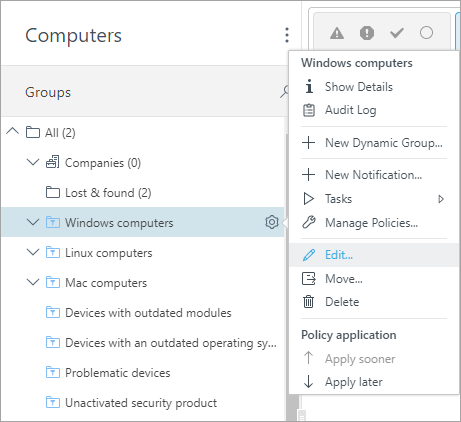Groups
You can manage groups from ![]() Computers. Groups enable you to organize endpoints on your network so that you can assign policies and tasks to them systematically. The setting applies to all the group members. Computers that are members of a group are listed on the right pane. Click the gear icon
Computers. Groups enable you to organize endpoints on your network so that you can assign policies and tasks to them systematically. The setting applies to all the group members. Computers that are members of a group are listed on the right pane. Click the gear icon ![]() next to a group name to see the available group actions and group details.
next to a group name to see the available group actions and group details.

There are two types of groups: static groups and dynamic groups.
Static Groups
•Static groups are groups of selected client computers and other objects.
•All mobile and computer devices are located in a static group.
•You can manually select which endpoints belong to any static group.
•An object can only be present in one static group.
•Static groups play an important role in the ESET PROTECT security model.
•If you import licenses from ESET Business Account or ESET MSP Administrator, your ESET Business Account company structure (including sites) or ESET MSP Administrator structure will appear in the Static Group tree.
Dynamic Groups
•You can understand dynamic groups as custom filters where one can set rules to filter computers accordingly.
•Dynamic groups are template-based and automatically include endpoints that meet the criteria established in your template.
•If a client device does not meet the criteria, it is automatically removed from the dynamic group.
•A computer can be in various dynamic groups at the same time or in none at all.
Knowledgebase articles are available to help you add computers to static groups, create new dynamic group templates, and assign a policy to a group.
You can find additional information on groups in Groups.
